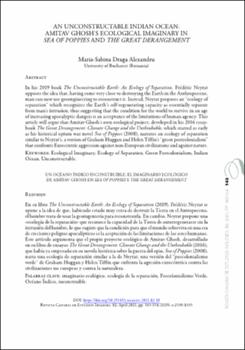An Unconstructable Indian Ocean: Amitav Ghosh’s Ecological Imaginary in Sea of Poppies and The Great Derangement
Fecha
2021Resumen
En su libro The Unconstructable Earth: An Ecology of Separation (2019), Frédéric Neyrat se
opone a la idea de que, habiendo estado muy cerca de destruir la Tierra en el Antropoceno,
el hombre trata de usar la geoingeniería para reconstruirla. En cambio, Neyrat propone una
«ecología de la separación» que reconoce la capacidad de la Tierra de autorregenerarse sin la
intrusión del hombre, lo que sugiere que la condición para que el mundo sobreviva en una era
de crecientes peligros apocalípticos es la aceptación de las limitaciones de los seres humanos.
Este artículo argumenta que el propio proyecto ecológico de Amitav Ghosh, desarrollado
en su libro de ensayos The Great Derangement: Climate Change and the Unthinkable (2016),
que había ya empezado en su novela histórica sobre la guerra del opio, Sea of Poppies (2008),
narra una ecología de separación similar a la de Neyrat, una versión del “poscolonialismo
verde” de Graham Huggan y Helen Tiffin que enfrenta la agresión eurocéntrica contra las
civilizaciones no europeas y contra la naturaleza. In his 2019 book The Unconstructable Earth: An Ecology of Separation, Frédéric Neyrat
opposes the idea that, having come very close to destroying the Earth in the Anthropocene,
man can now use geoengineering to reconstruct it. Instead, Neyrat proposes an “ecology of
separation” which recognizes the Earth’s self-regenerating capacity as essentially separate
from man’s intrusion, thus suggesting that the condition for the world to survive in an age
of increasing apocalyptic dangers is an acceptance of the limitations of human agency. This
article will argue that Amitav Ghosh’s own ecological project, developed in his 2016 essay-
book The Great Derangement: Climate Change and the Unthinkable, which started as early
as his historical opium war novel Sea of Poppies (2008), narrates an ecology of separation
similar to Neyrat’s, a version of Graham Huggan and Helen Tiffin’s “green postcolonialism”
that confronts Eurocentric aggression against non-European civilizations and against nature.





